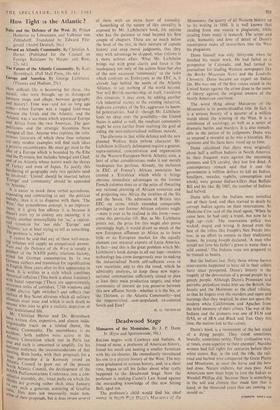How Tight is the Atlantic?
Nato and the Defence of the West. By Prince Hubertus zu Lowenstein and Volkmar von Ztihlsdorff. Translated by Edward Fitz- gerald. (Andre Deutsch, 36s.) The Future of the Atlantic Community, By Kurt Birrenbach. (Pall Mall. Press, 18s. 6d.)
Row difficult life is becoming for those, like myself, who were brought up to distinguish between maps and chaps, between geography and history! Time was—and not so long ago either—when Europe was a ragged land-mass between the Urals and the Atlantic, and the Atlantic was a sea-mass which separated Europe and Africa from the two Americas. The geo- politicians and the strategic historians have changed all that. Anyone who explores the volu- ntinous literature of which these four volumes are only modest examples will find such ideas a Positive encumbrance. He must get used to the idea of a Europe which is bounded by the Elbe and the Pyrenees, but includes Senegal and Chad, and of an Atlantic whose waters wash the shores of Turkey and even of Japan. To justify this butchering of geography only two epithets need be involved : 'United' should be inserted before 'Europe' and 'community' should be appended to 'Atlantic.
It is easier to mock these verbal accordeons, expanding and contracting to suit the political Vest,' than it is to dispense with them. 'The "Test,' that penumbrous concept, is no improve- ment; if it gives less offence it is because it doesn't even try to convey any meaning; it is merely another monosyllable for 'us,' a capital- ised synonym for 'our side.' Europe' and 'Atlantic' are at least trying to tell us something. The problem is, what? It cannot be said that any of these well-mean- ing volumes will supply an unequivocal answer. Aral° and the Defence of the West is simply a Product of the NATO public relations factory, styled for German consumption by its two German authors and translated for republication tn English three years after its first appearance in Bonn. It is written in a style which combines rhetorical inflation ('This book is about freedom') W, itb banal reportage (`There are approximately ciesveriteen miles of corridors, 7,748 windows and , ,000 electric light switches') and reflects that alliances of Boy Scout altruism which all military it'"'ances must wear and which is such death to
their who tries to give a realistic depiction of 'nen' instittitional life.
k 1*. Christian Herter and Dr. Birrenbach i';ave written slim, expensive, and almost indis- 'Anguishable tracts on a related theme, the Atlantic Community. The resemblance is no accident; both authors were active in the Atlantic Convention which met in Paris last „„!! and each is concerned to amplify, for his "'tonal audience, the recommendations of that trarneedng. Both books, with their proposals for a L Atr.: Partnershi et la Kennedy round an N 'antic Councilp to grow out of the present NAT Atlantic Council, the development of the suitailt9 Parliamentarians Conference into .a con- this„Ive assembly, etc., tread paths on which the 14 `..`es are growing rather thick since January tresaw such a generous scattering of Gaullist sell • This does not necessarily make non- ''e of their proposals, but it does invest several
of them with an extra layer of unreality.
Something of the nature of this unreality is exposed by Mr. Lichtheim's book, for anyone who has the patience to read beyond his first couple of chapters. These are so much below the level of the rest, in their mixture of capsule history and snap moral judgments, that they may with advantage be skipped; what follows is a more serious affair. What Mr. Lichtheim brings out with great clarity and force is the inadequacy not only of the nation State but also of the new successor 'community' to the tasks which confront us. Embryonic as the EEC is, it already lags behind the needs of the Atlantic Alliance, to say nothing of the world beyond. Nor will British membership, of itself, transform this situation; it may even, by adding another rich industrial society to the existing industrial, high-cost complex of the Six, aggravate its harm- ful potentialities. And if—though Mr. Lichtheim loses no sleep over the possibility—the United States is added as well, the resultant community might be even further from realising the goal of aiding the non-industrialised millions outside.
The dilemma in that while defence and the new planned Welfare State (whose character Mr. Lichtheini brilliantly delineates) require a greater, supra-national, concentration and organisation in the Western-European-North Atlantic area, a host of other considerations make it not merely inadequate but perilous. Already, the inclusion in EEC of France's African associates has created a 'Eurafrica' which while it brings obvious immediate advantages to the former French colonies does so at the price of thwarting any rational planning of African resources and of projecting into Africa the rivalries of the Six and the Seven. The admission of Britain into EEC on terms which extended comparable privileges to our former African colonies might —were it ever to be realised in this form—over- come this particular rift. But, as Mr. Lichtheim points out, the price for this might also prove alarmingly high; it would divert so much of the new European affluence to Africa as to leave little or no European market for the equally clamant raw material exports of Latin America. In fact—and this is the great problem which Mr. Lichtheim's book dumps in all our laps—modern technology has come dangerously near to making the industrialised North self-sufficient even in raw materials; add to this the trend, which he admirably analyses, to keep these new supra- national communities sufficiently closed to plan at least their main production targets, and what community of interest do you preserve between this new affluent North—whether it is the Six, or the Thirteen, or the Atlantic Community—and the impoverished, over-populated, ex-colonial South and East?
H. G. NICHOLAS


































 Previous page
Previous page